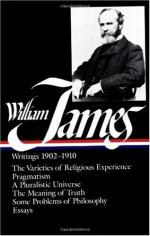
|
| Name: _________________________ | Period: ___________________ |
This test consists of 15 multiple choice questions and 5 short answer questions.
Multiple Choice Questions
1. James states that which viewpoint is the process for determining truth?
(a) Pragmatism.
(b) Pantheism.
(c) Monism.
(d) Pluralism.
2. Humans react in what way to new information, according to James?
(a) They are comforted by new information.
(b) They are wary of new information.
(c) They are accepting of new information.
(d) They are angry at new information.
3. What position is described as holding that even in vast fields of sameness, there is still difference?
(a) Monism.
(b) Pragmatism.
(c) Pluralism.
(d) Intellectualism.
4. In excess, what does James believe devoutness becomes?
(a) Religion.
(b) Ascetism.
(c) Insanity.
(d) Fanaticism.
5. According to James, what is within the realm of sensory experience prior to cognition?
(a) Freedom.
(b) Empiricism.
(c) Determinism.
(d) Intelligence.
6. What does James describe as occurring when the whole changes all things contained within it must also change as a singular act?
(a) Inductive reasoning.
(b) Logical operation.
(c) Immanent operation.
(d) Singular operation.
7. Fechner believed that consciousness is based on which of the following?
(a) Intelligence and reasoning.
(b) Organization and needs.
(c) Deductiveness and inductiveness.
(d) Logic and instinct.
8. James asserts that inquiry is secondly designed to evaluate which of the following?
(a) The decision one makes to become happy.
(b) The motivation one person has to change.
(c) The meaning or importance of a thing.
(d) The significance of a person.
9. What viewpoint does James attribute to being aggressive and radical?
(a) Monist.
(b) Pantheistic.
(c) Religious.
(d) Pragmatic.
10. What position does James attribute to being the 'each-form'?
(a) Theist.
(b) Pluralist.
(c) Meliorist.
(d) Monist.
11. What does James identify as the "fruits" of religion?
(a) Charity for those in need.
(b) Morality.
(c) Cultural benefits of saintliness.
(d) Ascetism.
12. What does James attribute to using parts to explain wholes?
(a) Rationalism.
(b) Empiricism.
(c) Pragmatism.
(d) Monism.
13. What type of unity does James define as being the relationship of things that seem to tell a story together?
(a) Empirical.
(b) Casual.
(c) Beings.
(d) Aesthetic.
14. Which phrase does James use to describe common sense?
(a) Stage of development.
(b) Thinking pattern.
(c) Cycle of life.
(d) Symptom of aging.
15. What does James describe as being both sublime and trivial?
(a) Science.
(b) Religion.
(c) Psychology.
(d) Philosophy.
Short Answer Questions
1. How does James describe ineffability?
2. According to James, there are two ways of looking at the whole of the universe. What are these ways?
3. What position does James describe as being based on principles of intellectualism and idealism?
4. Who believed that inclusive forms of consciousness are partly generated by less inclusive forms?
5. Fechner's faith saved him from which of the following, according to James?
|
This section contains 420 words (approx. 2 pages at 300 words per page) |

|




